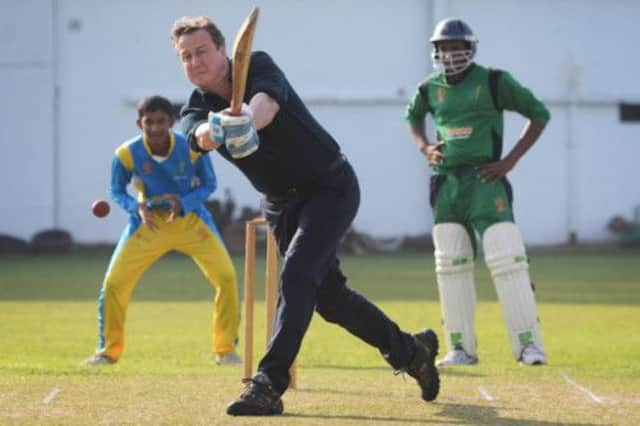David Cameron under fire in Sri Lanka


Rajapaksa declared “people in glass houses shouldn’t throw stones” and accused his critics of ignoring the plight of his people during a 27-year Tamil insurgency.
Speaking on the second day of the Commonwealth Heads of Government Meeting in the island nation – which Prince Charles opened on behalf of the Queen on Friday – Rajapaksa added:
Advertisement
Hide AdAdvertisement
Hide Ad“Every day for the past 30 years people were dying ... so we have stopped it.”
Responding to demands for an official inquiry into atrocities, he added: “We will take our time and we will investigate into 30 years of war.”
Rajapaksa was responding to remarks the British Prime Minister made after a fact-finding visit to the war-scarred north, previously a stronghold of the Tamil Tigers rebels.
There he met some of the hundreds of ethnic Tamils still living in camps after their homes and lands were seized during the conflict. He is the first foreign leader to visit the north since Sri Lanka gained independence in 1948. At one point he was besieged by more than 200 protesters.
Cameron said he later held a “frank” discussion with Rajapaksa and pledged to press the issue of alleged human rights abuses by the Sri Lanka army with the United Nations if no progress were made by March.
Cameron told reporters: “Not everything I said was accepted, but I sense they do want to make progress on these issues, and it will help frankly by having international pressure in order to make sure that that happens.”
He said he believed an independent investigation was of prime importance, as well as guarantees of press freedom and the resettlement of people displaced by the war, which ended in 2009.
“Let me be very clear: if that investigation is not completed by March, then I will use our position on the UN Human Rights Council to call for a full credible independent international inquiry,” he said.
Advertisement
Hide AdAdvertisement
Hide AdCameron said he had given a “fair reflection” of the need for improved human rights. “I think he [Rajapaska] acknowledged that I was right to come and right to visit,” he said.
“Of course I was told all sorts of things in the north and there are very strong differing views on some issues.
“I think I’ve given a fair reflection of some of the things that need to happen in terms of reconciliation, in terms of progress, human rights, free speech, and I think it’s important to raise these issues.”
Yesterday, however, Rajapaksa told reporters he had already appointed several internal commissions of inquiry –though these fall short of international demands. “We have done what we can do,” he said. “We need time to settle these things.”
He also questioned Cameron’s approach, saying “pressure won’t do anything” to sway Sri Lanka.
Basil Rajapaksa, the president’s brother and a senior minister, had already rejected Cameron’s call for an inquiry, saying it “definitely” would not be allowed to take place.
Earlier, cricketer Muttiah Muralitharan, who met Cameron when he visited Sri Lanka’s national cricket academy in Colombo, suggested the Tory leader had been given a false picture of Sr Lanka.
He said: “He must have been misled. People speak without going and seeing the things there. I see from my eyes there is improvement. There were problems in the last 30 years in those areas. Nobody could move there. Now I regularly go and I see the place and it is about a 1,000 per cent improvement in facilities. This country is 20-odd million people. In the north there are only one million. They are getting more attention than the south at the moment.”
Advertisement
Hide AdAdvertisement
Hide AdCameron also said Britain would provide £2.2 million for de-mining the north, though Sri Lanka’s military said yesterday 96 per cent of the area had already been de-mined.
A UN report has suggested Sri Lanka’s Sinhalese-dominated armed forces may have killed up to 40,000 Tamils toward the end of the war.
Tamil rebels, who were fighting for autonomy, have been accused of killing civilians, using them as human shields and press-ganging children into their ranks. Rajapaksa’s regime is also accused of harassing the media and rights abuse. But he denies the army was involved, and says Sri Lanka’s courts can handle any complaints.
The International Bar Association’s Human Rights Institute, however, has claimed Sri Lanka’s courts lack judicial independence.
Prince Charles ended his tour of Sri Lanka yesterday with a visit to a home for disabled children in the central town of Nuwara Eliya, near Kandy, where he took part in an impromptu hokey-cokey.
SEE ALSO: